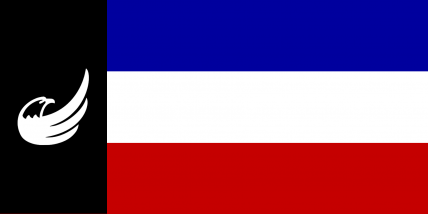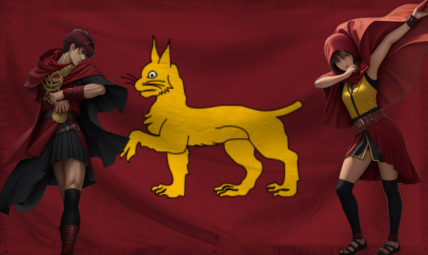Theban Colony Project
Many different civilizations have risen and fallen over the course of the ages, they follow a sublime arc from excellence to immortality and complete their life as the legacy of an unconscious human idea, self-justified systems of living and being come to life. There have been many great civilizations on NationStates, from the savage and the all-powerful to the refined and erudite, and each has expressed a truth about themselves through their unique lives as states, evidencing some intangible belief about the universe. A mighty kingdom crushes other nations, bashing down their fine objects, trampling atop their works and buildings – such a peoples shows through their destiny a vision of human society as unstoppable, intractable domination perpetuated against the provocations of life itself. A cosmopolitan country becomes the embodiment of adaptive pragmatism, a religious people determinedly live out the dictates of their spiritual conscience. Thebes, the city Reborn from ashes through the intervention of the divine mercy, devoutly lives out an undying effort to obey the whims of the elusive Olympian gods and to know and abide by their enlightened precepts. For the Thebans, there is in every kind of function some humble appreciation for the divine wisdom, they are also captivated just as they are enlightened by their awareness of the true good. In many ways – through temperament, through inclination, and through experience – this unique quality has made Thebes one of the most successful and most prolific colonizers of the NationStates world.
And that’s where you come in.
This is an opportunity to expand YN’s historical background and international relations. My nation, Thebes, I RP as being a famous colonial motherland to numerous overseas colonies established throughout history. I am soliciting people to apply for and receive their own historical Theban colony in their geographic boundaries, at whatever historical date. Thebes’ historical background info, which is exhaustive, covers long ages between 330 BCE to the present. Not only would the Thebans, proud Hellenic Greeks, have founded dozens of overseas colonies during all that time, but there is [even better] the notion of wars, rebellions, discoveries, intrigues, etc. rising and falling with the eons at the same time. This is a great opportunity to add to our nations, by creating historical wars, alliances, and conflicts over more than 1000 years.
I want you to feel free to make up your own stuff for this idea. You can describe any kind of premise you like, my job is to see how it can work. It can be very simple or it can be really intricate. I have an app form for people who like to use that, but you can specify anything you like.
LIST OF COLONIES
APPLICATION
Date of Colony Founding:
YN’s Historical Name (at time):
YN’s Historical Ruler (at that time):
Name of Colony:
Location of Colony:
Initial Pop:
Did YN eventually conquer this colony?:
Present Day Status:
History of the Colony in YN:
A GENERAL SYNOPSIS ON THE COLONIES. As an RP’er, I am only competitive by agreement, and I do not RP to seriously attack or challenge anyone without their interest. Of course I hope that these colonies can be the historical cause of plenty of wars, blockades, skirmishes, but that is up to what you desire. If, let’s say, you were interested in the idea but you had reservations about creating a colony of mine in your country (especially if it still exists in some capacity), because of a power concern, there is no need to worry, you are welcome to claim it as inert or just spice for YN.
Theban colonies were, broadly speaking, of the classical Greek type and are generally founded near the coastline, or using easy access by river or valley. They were usually a single urban center and it would have been rare for them to grow significantly in territory or establish other colonies (but not entirely impossible). In hostile regions, they were sometimes constructed in more unusual terrain as a defensive measure. More specific details depend on the time period, and of course every colony is unique for its founders and its host context. Before what we call the Middle Ages, Theban colonies adhered to the stereotype of Greek colonies as distant outposts somewhat inclined to keep to themselves, and warding foreigners off from their borders while taking advantage of local commerce. When the Theban monarchy began trying to integrate them, roughly 1300-1600 AD, they became tools of royal politics and were significantly more likely to be the staging point for armies of conquest.
Inasmuch as its colonies, the periods of Theban history can be broken down like so:
EARLY REPUBLIC (330 BC – 200 AD) – no colonies further beyond than the territory of present day’s Commonwealth (Theban homeland) are known to have been founded in the period of the Early Republic. Some legendary colonies which appear or are believed to appear in overseas myths may have originated from individual Thebans settling themselves in foreign lands, as most of this period was known for robust sea commerce.
LATE REPUBLIC (300 - 781 AD) – The later Republic is a historical period noted for its large number of colonies. In this period, two primary types of colony were often settled, one which was driven mostly by the exodus of parties of extremist dissident philosophers, and a second type which were military colonies established by the Republic itself, which was steadily turning into a totalitarian dictatorship. The former usually paid lip-service to their kinship with the homeland, except for severe danger or necessity, while remaining largely estranged; the latter form of colony was generally smaller and less populous at first, but contained some form of armed garrison and primarily served as a series of outposts for Theban maritime commerce.
EARLY MONARCHY (800 – 1350 AD) – At the end of the 8th Century, Hagias Katarkonides the military dictator of the Republic accepted a staged offer from the Council to become King of Thebes, in a process littered with the trappings of godhood. The Katarkonid quest to create an Empire out of the community of their neighbors lasted for centuries. Although most of their time and energy was consumed by that effort, some notable colonies still were settled during this early period of the monarchy, even if they were mostly just conspicuous displays of power. While there were only a handful of state-sanctioned colonies, this period also saw the creation of a number of independent Theban colonies founded by adventurers, dissidents, and visionaries of all kinds.
LATE MONARCHY (1400 – 1670 AD) – The end of the monarchial period, from the birth of the Panteloarchesthai movement to the completion of the Revolution in 1669, is considered to be one of the most active periods of colonial activity in Theban history. Not only were countless colonies founded at this time, benefiting from the crown’s wide-open embrace of its overseas offspring and generous desire to patronize them, but there was also a huge spike in colonial population growth owing to the mastery of new homesteading techniques and the emigration of many from the homeland, as the links between Thebes and its overseas colonies grew much more stable and closer than ever before. During the Revolution, which lasted roughly from 1630 to 1669, this integration was thrown into chaos as Thebes’ colonies struggled with whether to choose sides or try and remain neutral.
COMMONWEALTH (1669 AD – present) – In some respects, the period since the completion of the Revolution has been the greatest yet for Theban colonialism. Protected by the mighty Royal Navy, supported by an activist foreign policy and receiving a massive wave of investment and population growth, those Theban colonies which remained intact by the time of the Commonwealth quickly became states in their own right, and began to exercise influence on their respective regions as legitimate powers. Wholly new attempts at colonization, however, although pursued at times with a fervor, were significantly less successful than they had been in the past, as attempts to found new colonies generally led to explosive wars, diplomatic turmoil, and widespread devastation, usually to the detriment of all involved. Those which succeeded, were oftentimes known for their neo-revolutionary zeal, and imagined as utopia projects.







